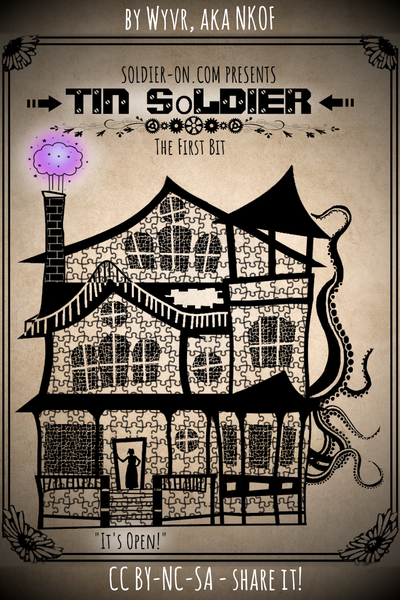Illustration: Hyacinth’s tarot card, The Medic, based on The Empress. She is standing in her kitchen with goggles and a blowtorch, grinning.
[PSI-3]
“Cin?” She stood at the top of the stairs. Upon consideration, she came down a few. “There are kind of a lot of people coming up Green Dragon Alley. Some of them have torches. Quite a few of them have torches, actually.”
“Torches?” said Hyacinth. She hauled stiffly to her feet. “Honestly?”
“Well, the lamp lighters haven’t been,” Ann allowed, trailing down the rest of the way.
“Any pitchforks?”
“Not that I’ve noticed, but I wouldn’t rule it out, I suppose. Is there anything at all you need from me down here?”
Hyacinth took her hand and mounted the first two steps with assistance. The pins and needles were a hindrance. She hadn’t noticed when she’d been sitting. “Yes, stay with him. Don’t touch him, not unless he’s going to hurt himself.”
“Oh, no. The poor thing! How would he hurt himself?”
“Well, he might puke.”
“Oh.”
“But don’t touch him to comfort him. You’ll just hurt him.”
“Oh,” but this time with a great deal more pity. “Cin,” Ann lifted a finger, “if they should happen to make any attempt to burn down the house…”
“Grab him and run, yes.” Hyacinth had attained the main floor. She looked down with a smile. “...It’s not as if it would help to bar the door.”
There was neither a door here nor a bar. Inhabitants of this house, impaired as they were, had to be trusted not to fling themselves headlong down the stairs. At least not accidentally.
Barnaby was kneeling with his bathrobe splayed theatrically around him, and bashing the floor with a half-brick. “The tile here is badly broken,” he explained without prompting.
“Thank you,” she managed. A sharper remark might result in an argument, and she had no time. “Are you just about done?”
“Why? What are you doing?”
“Facing an angry mob.”
“Well, then this is imperative.” He began chipping away at the tile again.
At least he was in a good position to get out, should such a thing become necessary.
The front door fell open. It had been a few hours, but nobody had taken the time to fix it, or even to loop some more string through the hole. Hyacinth implicitly approved of this kind of neglect, even when it extended to smashing the floor. Repairs were for people.
There were kind of a lot of people in the yard, and more filing in. The women, in their long skirts, favoured the gate and the lowest places. The men were better able to hop the crumbling walls without getting snagged.
These were not slum people, whose clothing was tissue-thin and stood much trading and mending, but they were by no means wealthy people. Those who could wound their wardrobe with impunity had fled the city during the siege, and in the years since they had returned only in patches. They were not liable to be climbing fences and carrying torches.
These people were below the middle and above the bottom. In-between people, labourers with just enough skill to be trusted with cash registers, underemployed and unemployed. Renters who ran up lines of credit for furniture they couldn’t afford and groceries they didn’t always eat. People with just enough to really feel it when they had to do without.
Testy people.
They were throwing things at the house. Loose cobbles. Bricks. There were plenty in the front yard. Someone shattered the front window just as Hyacinth emerged.
“All right, that’s enough!” she snarled. She positioned herself at the top of the stairs, which gave her a slight advantage in height and scope. “I know you’re here, don’t I? You assholes aren’t subtle!”
Someone pegged a rock at her. She didn’t duck. She turned slightly and took it on the left side of her head. It was a calculated risk. She hoped the projectile was small enough and her own metalwork strong enough to prove impressive.
The stone bounced off with a faint ping, like a hammer striking the post of a chain link fence.
There was a little bit of blood, which she ignored. She did not fall. She frowned.
That shut them all up.
“What did I just say?” she demanded of her audience, one finger pointing heavenwards for attention.
That might’ve been enough, in other circumstances. Normal people did not live here; it was best to leave them in peace. But there were some in this crowd who had come with a personal agenda.
A woman in front wore a long black dress and a white apron, either a shopkeeper or one of the better class of servant. She held a lantern aloft.
The lantern bespoke thought and purpose. Torches, by comparison, were fast and easy, borne by passionate bystanders swept up from the street. It might’ve been a positive sign to see more torches.
The woman was picking her way through the scrap wood with a disdainful expression, more disgusted than wary at the prospect of tetanus.
“Send him out!” she said. A few in the crowd picked up the cry and echoed it.
Hyacinth addressed them all as one, “Who’re you looking for?”
“The magician!” the woman said.
“I got a few of those,” said Hyacinth. “I got an old augur who couldn’t predict sunrise at cockcrow. You want him?”
Some laughter at this. A few voices said, “Yeah!”
“No!” said the woman.
“I got an ex-general with a real big ego who can turn into an even bigger bird. She eats pigeons! You want her?”
More positive reaction from the crowd. “Sure! Bring them all out!” The woman turned on them with a murderous frown.
“I got a minor enchanter. Works in that factory that makes Windless Watches!”
“Windless Watches suck!” a male voice cried with violent good humour.
Hyacinth nodded broadly. “Yeah. But a job’s a job, right?”
Various affirmative noises. Most of these people were here to see what was going to happen next. This was sufficiently entertaining.
The woman in the black dress intimated her stake in the matter: “My child is dying!” she howled.
Silence, then. Hyacinth spoke clearly into it, “And would your child be one of a couple young men who thought it might be funny to kick a six-year-old boy to death?”
“The horses kicked him!” the woman said. “My boy was helping him up!”
“Your boy was holding him down!”
“He’s in the hospital! Half his face is gone!”
“My boy too!” a querulous woman in a green dress and shawl asserted. “My Johnny didn’t do anything!”
“Send out the murderer!”
“Nobody here’s done murder yet!” said Hyacinth. “You yahoos out here are the only ones looking to start! I got a little boy in the basement who’s damn near dead! And let me tell you, if it was horses kicking him, he never would’ve made it here!”
She accused the audience with a pointed finger, “Someone thought they’d have a little fun with him! Bruise him! Crack his ribs! Coloured children are made of rubber, aren’t they?”
“Well, aren’t they?” someone shouted.
“This one’s made of tin now,” she said coldly, “because that’s all I had to fix him with.”
Muttered discussion. Even if they weren’t familiar with repairs made to living bodies, they knew tin was a cheap material for patches.
“At least he has a chance!” said one of the women.
Now, at last, Hyacinth dropped her attention from the crowd and spoke to the women alone, “The same as your children, if you bring them here. Less, if you bring me better material. Steel, and gold. Or silver, if that’s the best you have, but gold is better. Bear that in mind when you go through your jewellery.”
“And the cost?” said the woman in black.
Anyone who’d heard of Hyacinth knew he didn’t work for free. She never charged more than one could afford, and the more-fortunate often resented it. If she would do work for food, why should they have to pay money?
The wealthiest, of course, felt no need to go skulking around back alleys in search of practising ex-medics, but she would’ve billed them within an inch of their lives.
“No cost,” she replied, “only the material. And the time to use it.”
She raised her voice, again including the crowd, “So I will thank you to refrain from setting my yard on fire — even by accident!” This last was addressed to an older gentleman who was examining a pile of orange crates with a dripping torch. “And these women will too!”
There were a few boos. “Killjoy!” a soot-stained urchin called through cupped hands. The man over by the orange crates straightened and opined, “These are some good slats over here!”
“By all means, have them!” Hyacinth replied. “And have off! We only want damaged things here!”
She turned on her heel. She could not slam the door. She had to lift it and open it, set it down, lift it again and close it.
“We’ll be back here!” a woman cried.
Hyacinth lifted the door, opened it a crack and set it down. “I’m not going anywhere!” she snapped.
She lifted the door and closed it. “Knock next time, damn it!” she added through the wood.
Safer, if momentarily, she clasped a hand to her temple and cried out, “Ow, motherfucker, that hurts!”
There was a brief bright flash that turned the flesh of her hand orange and showed the shadows of the bones inside, then the steel plate flattened into place and the dent filled back in. She closed the gash with a single staple, drawn from the metal beneath. She’d put it back where it belonged when she didn’t need it anymore.
Light-headed, she stumbled and leaned back against the door. It quivered and said it was not going to support her, so she put a hand on the frame.
“I saw that,” Barnaby said. He had ceased damaging the tile and was examining its placement in the greater fabric of the universe. Sixteen pieces was a great deal more auspicious than twelve, he thought.
His faded cloth slippers showed blue-veined and swollen ankles above.
Mordecai only pretended to be very old and tragic, Barnaby was living the dream. He did not often come down from the attic, finding it difficult to negotiate the stairs and upsetting to be among chaos. He wore the bathrobe over silk pyjamas and he had entirely given up on combing whatever remained of his hair, perhaps afraid the attention would scare it away.
“Did you?” Hyacinth said evenly.
“It was unavoidable,” he said. “I didn’t want to worry you.”
“Bless your withered little heart,” Hyacinth managed, tightly.
“This is exactly the sort of thing a little proactive organization can prevent. Cousin Violet can’t do everything, can she? I saw what happened to the boy.”
She pushed away from the door and came forward a few threatening paces, shaking one finger, “Barnaby, not one word about that to Mordecai, or about whether you could’ve fixed it or not, it’s enough that it happened.”
“It could be very important!” he declared. “The fates of empires could rise and fall!”
“It is important,” she hissed. “If you’re worried about empires, put it down in your charts and work on it by yourself.”
“I am not allowed upstairs, and might I remind you that is at your request? I keep telling you, the house is not going to burn down, it is going to explode.”
“There is a notepad in the kitchen!” she said. “Work on it there!”
There was a knock at the door.
“What?” she demanded of the closed wood, turning on it. She lifted it and opened it.
A young boy in a slouch hat and red bow tie was standing on the porch and bleeding.
She recognized him instantly, more so the tie than the smudged and shadowed face. “Soup? What are you doing here?”
“I fell climbing over your wall, Miss Hyacinth.”
“Were you throwing rocks at us?”
“No, ma’am. I just wanted to see what was gonna happen.”
She sighed. It didn’t really matter if he had been throwing rocks. It didn’t matter if he’d hit her. Nobody else was going to take care of him. Soup didn’t even have parents, she didn’t think. “All right. Come inside and I’ll fix you.”
He hopped on one leg. The grey stocking on the other one was torn and dripping. She couldn’t help him while she managed the door. He looked up in passing and asked her, “Do you have anything to eat?”
“I got some Nadine’s Boxed Noodles, will that do you?”
He displayed a fetchingly gap-toothed grin. (The really poor ones were always cutest. It was like a survival thing. But they got old fast.) “Hey, thanks!”











Comments (0)
See all